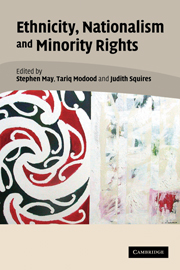Book contents
- Frontmatter
- Contents
- Preface
- List of contributors
- 1 Ethnicity, nationalism, and minority rights: charting the disciplinary debates
- Part I Ethnicity and ethnic groups
- 2 Ethnicities and multiculturalisms: politics of boundaries
- 3 Ethnicity without groups
- 4 Ethnicity, class, and the 1999 Mauritian riots
- 5 Black nationalism and African American ethnicity: the case of Afrocentrism as civil religion
- Part II The state and minority claims
- Part III New directions
- Index
- References
5 - Black nationalism and African American ethnicity: the case of Afrocentrism as civil religion
Published online by Cambridge University Press: 22 September 2009
- Frontmatter
- Contents
- Preface
- List of contributors
- 1 Ethnicity, nationalism, and minority rights: charting the disciplinary debates
- Part I Ethnicity and ethnic groups
- 2 Ethnicities and multiculturalisms: politics of boundaries
- 3 Ethnicity without groups
- 4 Ethnicity, class, and the 1999 Mauritian riots
- 5 Black nationalism and African American ethnicity: the case of Afrocentrism as civil religion
- Part II The state and minority claims
- Part III New directions
- Index
- References
Summary
The changes generated by postcoloniality, global capitalism, and new technologies have sparked a lively debate about the contours and meaning of the “new” racism in the United States. Some scrutinize the transformation of contemporary US society as a racialized social system composed of structural and ideological dimensions (Bonilla-Silva 1996). When it comes to African Americans, structurally, American society has not made the gains in desegregating its housing, schools, and employment promised by the civil rights movement (Massey and Denton 1993). One study of Atlanta, Georgia revealed that neighborhood-level racial resegregation is emerging as a new spatial pattern within major American cities, even those with a politically enfranchised and highly visible Black middle class (Orfield and Ashkinaze 1991). Emerging research points to the growth of a prison-industrial complex as an important new site for institutionalized racism confronting working-class and poor African Americans and Latinos (Miller 1996). Ideologically, a belief in upholding “colorblindness” masks the continued inequalities of contemporary racism. By proclaiming that equal treatment of individuals under the law is sufficient for addressing racism, this ideology redefines group-based, antiracist remedies such as affirmative action as being “racist” (Crenshaw 1997).
How should African Americans respond to the promise and the disappointments of this “new” racism that operates through the curious combination of a structurally incomplete desegregation cloaked by an ideology of “color-blind” inclusiveness? In this chapter, I sketch out how some African Americans refashioned the core ideas of Black Nationalism in attempts to negotiate the dilemmas of the “new” racism.
- Type
- Chapter
- Information
- Ethnicity, Nationalism, and Minority Rights , pp. 96 - 118Publisher: Cambridge University PressPrint publication year: 2004



